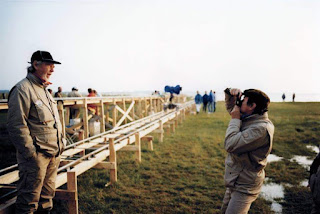Sardar Udham (2021, Shoojit Sircar)
Name - Sardar Udham
Director - Shoojit Sircar
Runtime - 160 mins
Platform - Amazon Prime Video
Biopics are an interesting as well as a very educational genre, especially in light of telling stories which the general audience has no idea or a cursory idea about. In my instance I had little to no idea about Sardar Udham Singh, and having not seen the trailer I went in completely blind.
Any biopic made by Bollywood usually follows a template. Most of the time it is a linear narrative. The first 20 to 30 mins would explore the early years, then an inciting incident will occur which will propel the narrative forward. The mid portion would explore the events of the biopic which most people are interested to see, with the final 20 minutes acting as a cascading anti-climax leading to a teary end.
The journey described above is the "how" of the individual explored in the biopic. Shoojit Sircar, director of Sardar Udham, is not interested in the "how". He is interested in the "why". That is the prevalent question propelling the narrative from the beginning until the final shot - Why is Sardar Udham Singh an angry man? Why is his focus so singular, his vision so pronounced? Why did he kill the Lt. Governor of Punjab Michael O'Dwyer, in a room full of people, in broad daylight? Why is he so adamant in making sure that his actions are registered as a protest, and not an inciting personal murder?
With the "why" as the singular question driving the narrative, writers Shirshendu Bhattacharya and Ritesh Shah craft a non-linear narrative, and as a result almost turn the structure of the biopic over its head. The usual climax, the aim of Udham Singh, to kill Lt. O'Dwyer, occurs within the first 30 mins, and then like a spider's web, the story thread explores outwards. Udham's journey across London, in an effort to find O'Dwyer, meeting his contacts at foggy locations, exchanging letters, connecting with like-minded individuals, escaping from meetings with arms dealers by the skin of his teeth - all of these events remind you of espionage heavy thrillers akin to a John Le Carre Novel, and the comparison feels apt as well, because Le Carre's spy thrillers always carried with it an air of gritty realism and a bleak opressive outlook towards the world.
But unlike Le Carre's novels, Udham Singh's world with its bleak oppressive outlook isn't caused by the protagonist weary aginst the world's manipulations. His oppressive events and circumstances come from his singular focus and vision, of ensuring that the ideals of his party is maintained, and freedom, true freedom is established, power snatched away from the imperial hands of the British. The non-linear storytelling helps in capturing those moments, when he is interrogated by Detective John Swain, and asked again "Why?". The non-linear script not only manages to capture the scope of the story but also manages to explore the ideology of Udham Singh as well as the members of the H.S.R.A, led by Bhagat Singh ( a scene stealing performance by Amol Pareshar). Pareshar's depiction of Bhagat Singh too is very different, a much more subdued, educated but no less angry individual.
The criticism which could be lobbied here is that this non-linear narrative becomes a huge deterrent in the pacing, and for the most part that is a true assessment. The length feels punishing, you feel exhausted, until the final "Why" is answered within the last 40 mins. The 1919 event, the Jalianwala Bagh massacre, was in the words of Udham Singh "a footnote in your history". Truer words had never been spoken until now. We had grown up reading about that massacre, and even having read those words and the number of deaths in the history books, the magnitude of the event finally hits us as the viewer - when Sircar takes a huge swing and crafts an essentially 2 minute sequence, into a 20 minute harrowing visualization of carnage, grief and existential horror.
The Jalianwala Bagh Masscare depicted in Sardar Udham not only manages to re-educate our own history, but re-contextualize Sardar Udham the character, and the movie as a whole. Udham Singh's character is forced to burrow any sense of humanity deep in the crevasses of his heart, the innumerable death and carnage caused crafting a trauma so great, that in order to cope with that Singh becomes rage and ideology molded into a person, thus causing a sense of disconnect between the character and the audience throughout the movie until the end. The Udham singh who could love someone, who was idealistic and happy about his life, was gone, along with the millions of people in the Jalianwala Bagh Massacre.
And while the visualization of said massacre, and the almost nonchalant way Dwyer dismisses that event as a necessity in curbing political rebellion, forces us to look at these officers as nothing more than evil personified, credit should be given to the writers for giving these people some empathy, some sense of humanity. Dyer after the massacre, instructing his subordinate to give a relaxation in the curfew at 8 a.m, so that the dead could be buried, Neville Chamberlain, in no uncertain terms stating that Dwyer's methods were a bridge too far, but ruefully acknowledging that he did serve this country - in no way are these supposed to make us empathize for the british, but it does make them as more human, and less one-dimensional cardboard cut-outs.
Flaws aside, Sardar Udham Singh is definitely a technical standout. 1930s - 40s London had never looked so beautiful or even so breathtakingly accurate. The production design had knocked it out of the park. Avik Mukhopadhyay's Cinematography is yet another standout. His lighting, compositions and even color palettes help Sardar Udham to stand out from the rest of the biopic pack. And Shantanu Moitra crafts a definite score here, instead of a song and dance routine. His original score oscillates between feelings of dread, poignancy while not overpowering the narrative.
Sardar Udham is a slow burn; its length is punishing at times, but at the end of the day it is rewarding. From a narrative standpoint, Shoojit Sircar uses his 160 mins in as deliberate a way as possible, in order to give justice to the story being told on screen. And the result we get is a biopic far different than the one we are used to, and we as an audience are all the better for it.
Rating - ⭐⭐⭐⭐.5/5
Sardar Udham is streaming on Amazon Prime Video









Comments
Post a Comment